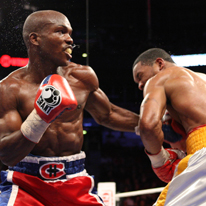On the economic map, Motown and American boxing are in the same spot

Symbols have been attached to the Timothy Bradley-Devon Alexander fight, so many in fact that they might outnumber the tickets sold for the junior-welterweight bout at the Silverdome, a blimp-like arena in Pontiac, Mich., that for years has been full of only empty seats and hot air.
Conflicting and perhaps premature projections promise only more empties and air. Even with a good walk-up before opening bell on Jan. 29, there will still be a lot of both.
Ten-to-fifteen thousand seats are for sale in an arena once big enough for two crowds of more than 93,000 each for Pope John Paul II and Wrestlemania in 1987. Promoters Don King and Gary Shaw said the plan always has been to set up the arena for a fraction of its current capacity, now said to be 70,000. That’s a lot of curtains.
The dismal projections are unfortunate, mostly because they have become a story that takes away from a bout, as significant as it is intriguing, between two unbeaten fighters, both African-Americans.
When the site was first announced, Shaw told reporters that he wanted to stage the fight in a city with a big African-American population. Atlanta or Detroit, he said.
Detroit, Motown, sounded good then. It might have been, if the town was Detroit instead of Pontiac, a dateline and troublesome symbol in itself. A new Pontiac is harder to find than a good American heavyweight these days. There are none. General Motors quit making the car in 2009.
For symbolism, Alexander-Bradley belongs about 30 miles away, in Detroit, at Joe Louis Arena, which was named for an iconic and African-American heavyweight who made his historic impact before Jackie Robinson broke major-league baseball’s color line and Muhammad Ali opened his mouth.
These days, The Joe is a hockey arena, home for the Detroit Red Wings. On the night of Alexander-Bradley, the Red Wings won’t be there, but college hockey will be with Michigan-versus-Michigan State.
I’m not sure whether there was an alternate date at The Joe or on HBO’s schedule. I’m also not sure whether any arena anywhere was willing to pay the $500,000 site fee that Shaw and King reportedly got from the Silverdome. That dollar sign might have been the biggest symbol at play.
Even if Alexander-Bradley had wound up at The Joe on a different date, it might not have mattered. Last March, Arthur Abraham’s disqualification in the Super Six bout against Andre Dirrell, a native of Flint, Mich., at The Joe drew a disappointing crowd, reportedly about 5,000.
Predictably, Shaw expressed frustration at criticism of the site during a conference call Tuesday.
“First, let’s wait until January 29 and find out how many people are in there,’’ said Shaw, Bradley’s promoter. “No. 2, I put on the greatest fight of the decade, (Diego) Corrales vs. (Jose Luis) Castillo and we didn’t sell even 2,000 tickets. I never heard anyone say that it wasn’t a fight that was extraordinary.
“We have two great undefeated American fighters and we went to a place we thought was befitting. We never set if for 70,000 – the set-up was always going to be between 10,000 and 15,000. Those that came to the press conference saw how it would be mapped out. The Silverdome was well-prepared and did a great job.
“There should be compliments to the new owner of the stadium who wants to do more boxing and is willing to take the risk to bring big-time boxing back to the Detroit area. I think it’s a terrific place to do the fight. I’m not sorry and Don’s not sorry. We are doing something for that economy. We are bringing HBO, which is going to shine a big spotlight on that economy.
“Everybody claimed a couple years ago the U.S. automobile industry was dead. If you’d all bought stock in those companies, you would be rich today.’’
Please, promoters aren’t in the business of propping up any economy other than their own.
Yet, Bradley-Alexander is a worthy fight, mostly because it has a chance to stimulate interest in boxing’s battered model of an American game.
In terms of philosophy, this one has a chance to be a game-changer. American fighters have become increasingly protective of their unbeaten records – the so-called 0, which both Alexander (21-0, 13 KOs) and Bradley possess (26-0, 11 KOs).
Greatness in boxing is often measured in large part by how a fighter comes back from defeat. Rocky Marciano is known for retiring unbeaten, but is his name at the top of any all-time, pound-for-pound lists?
King said a lot of things during Tuesday’s conference call.
“Ticket sales will not determine the greatness of this fight,’’ King said.
Yeah, and I’ll be the next chairman of GM.
But he did say something that could help boxing recapture some of the fan interest that has eroded precipitously since last year’s second round of abortive talks for Manny Pacquiao-Floyd Mayweather Jr.
The winner, King said, will be a superstar.
“But the loser will be a star, too,’’ said King, who echoed a comment from Bradley 10 days ago when the multi-skilled junior-welterweight said big fights were more important to him than the play-it-safe desire to protect the 0 and only the 0.
If Bradley-Alexander can help alter thinking behind a zero-sum game, it will be remembered as a winner, regardless of the zip code.
“We can spotlight this hard-hit economy,’’ said King, who talked about Motown as if it were boxing.
On the economic GPS, they’re in the same place.